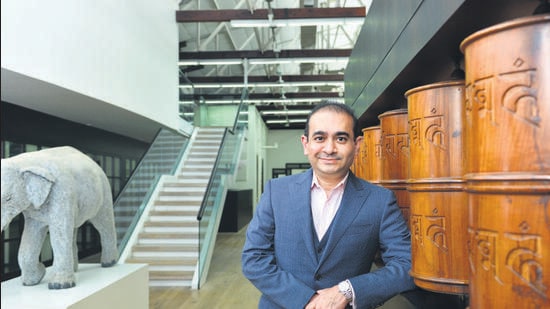HC in London begins hearing Nirav Modi’s plea in extradition case
The high court in London began its hearing in the final leg of the Nirav Modi extradition case on Tuesday. The day’s arguments saw an extended discussion on the definition of mild, moderate and severe depression.
The high court in London began its hearing in the final leg of the Nirav Modi extradition case on Tuesday. The day’s arguments saw an extended discussion on the definition of mild, moderate and severe depression.

The crux of Modi’s appeal is that his mental health is such that extraditing him to India would be oppressive and inevitably result in suicidal behaviour. Two leading forensic psychiatrists, Professor Andrew Forrester appeared for Nirav Modi while Professor Seena Fazel appeared for the Crown Prosecution Service (CPS). The evidence they gave was subjected to vigorous cross-examination and on several occasions the court had to grapple with the variance between clinical and legal terminologies.
Helen Malcolm of the Crown Prosecution Service said at one point that no matter what assurances Government of India gave, it never seemed enough for defence. She drew the court’s attention a video and photographs of Arthur Road Jail’s Barrack No. 12 to reassure Nirav Modi that he would not be sequestered in an overcrowded cell, to which the defence then questioned whether Modi would face solitary confinement. The court also heard that to allay fears of solitary confinement, GOI had also proposed that an undertrial in a white- collar criminal case, speaking the same language as Nirav Modi, would be kept in incarceration with him in Barrack No 12.
Edward Fitzgerald, Nirav Modi’s counsel, cited another case involving British national Ivor Fletcher whose extradition to India was halted as it was held that whatever steps are taken they would not necessarily prevent his attempts at suicide or self-harm. Fitzgerald then argued that that in Nirav Modi’s case adequate steps have not been taken to prevent a possible suicide.
The court asked prosecutor Helen Malcolm to draw up a short document (”not an essay”) on the concerns raised by the defence and the assurance received from GOI that addressed the concerns of the defence. Among the assurances submitted by India is a letter by Dr Vanshree Patil, head of the department of Psychiatry JJ Hospital. The letter lays out that Modi would be interviewed by a psychiatrist within 24 hours of his arrival and an action plan would be drawn to keep a watch on his mental health in consultation with a multi-disciplinary team.
“What is being assured is sketchy and vague. A personalised care plan is still required,” insisted Professor Forrester who appeared for Modi. The court heard from Prof Forrester that Nirav Modi who has been in jail in London feels his life at this point is “hopeless and pointless,” although Malcolm in her cross-examination asked the medical expert on the framing of the questions that led to Modi referring to his life being hopeless and pointless. The court also interjected and asked Prof Forrester what would the health protocol look like if he had to draw one for someone to be extradited to Britain reporting similar condition as Nirav Modi.
During his evidence, Professor Seena Fazel said that during his interaction with Nirav Modi (once in person and once through video) Modi told him he was reading newspapers from the beginning to the end, that he had a good appetite all of which, said Professor Fazel, was not consistent with those suffering from severe depression. Edward Fitzgerald during the cross-examination highlighted that the inferences drawn from these replies were misleading as the line of questioning was not correct.
While the arguments will continue on Wednesday, details emerged of Nirav Modi’s life in prison. He remains in a double cell in an ordinary wing of Wandsworth Prison. He exercises two to three times every week and gets to read newspapers, books. Provision has been made for him to speak to his family members (who are in New York) three to four times daily. He is also on medication and gets visits from health experts although he has not been cited serious enough by the prison staff to be referred to any hospital. Nirav Modi has a family history of depression and the court heard that that his mother died by suicide in front of him when he was a child and that has been an aggravating factor.





